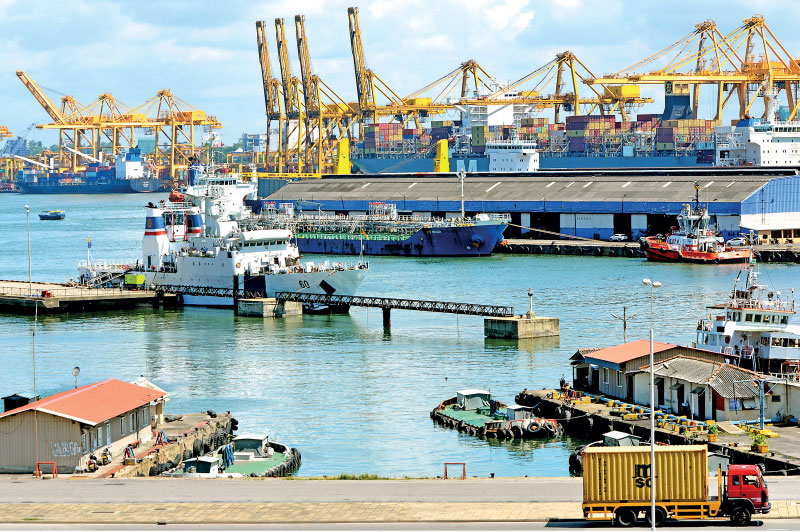Sunday Feb 22, 2026
Sunday Feb 22, 2026
Thursday, 21 October 2021 01:38 - - {{hitsCtrl.values.hits}}

While due appreciation for the efforts of exporters should be given by way of incentives and recognising their contribution, exporters should also realise their duty towards the country and its people, especially at a time like this, as profiting at the country’s expense will ultimately makes us all losers – Pic by Shehan Gunasekara
 The six-month Road Map for stability unveiled recently by newly-appointed Central Bank Governor Ajith Nivard Cabraal proposed to strengthen rules and regulations on mandatory exporter proceeds repatriation and conversions.
The six-month Road Map for stability unveiled recently by newly-appointed Central Bank Governor Ajith Nivard Cabraal proposed to strengthen rules and regulations on mandatory exporter proceeds repatriation and conversions.
The presentation made by Governor Cabraal further proposed to increase the effective tax rate on exporters who don’t comply with the conversion rules to 28% from the current 14%—even higher than the 24% corporate tax rate currently in force.
“We will strengthen mandatory conversion of export proceeds and request the Government to tax profits of exporters at 28% instead of 14% where the foreign exchange is not repatriated and converted,” Governor Cabraal said unveiling the Road Map.
These proposals have evidently stirred some controversy and dialogue in society, especially within the exporter community. Although the rules have been revised a few times in the last several months, as of now, exporters are required to repatriate entirety of their export proceeds within 180 days from the date of shipment and convert a minimum of 25% into rupees immediately, and the Central Bank purchases 10% of the converted proceeds to build the country’s foreign reserves.
However, according to a recent Information Note by the Central Bank, foreign exchange build-up at banks was estimated at about $ 1.9 billion between the period of January and July 2021. Also, the media reports, quoting the Central Bank, said exporters had not repatriated about $ 3 billion export earrings back to the country, a claim, which some exporter groups have vehemently refuted.
Why does Sri Lanka needs exporter dollars?
One might read some of the recent developments are reflective of a friction between the authorities and the exporters. No, it is not the case. Exporters are the key for Sri Lanka to emerge strong through these difficult times brought about by once-in-a-century pandemic.
Sri Lanka on a net basis has lost about $ 5 billion dollars cumulatively this year and last year from tourism due to the COVID-19 pandemic. It has also hindered other direct inflows, while merchandise exports and worker remittances remain the only two bright spots in the Sri Lanka’s external sector report card, although the latter has begun to slow down.
As a result, Sri Lanka is facing significant foreign exchange liquidity issues, particularly amid the country’s heavy external debt repayments and the rising global oil prices, as Sri Lanka is a net oil importer. It is estimated that Sri Lanka has to repay $ 4 billion worth of foreign loans per annum on average up till 2025. Sri Lanka’s total merchandise export income came down to $ 10 billion in 2020 from $ 12 billion in 2019, and for the first eight months of this year, the cumulative export earnings was at $ 7.8 billion.
Case of a few bad apples?
After the Central Bank’s claims, there had been some statements made by certain exporter groups, expressing their concerns on the Central Bank’s viewpoint. Sri Lanka Association of Manufacturers and Exporters of Rubber Products (SLAMERP) expressed its grave concerns about the Central Bank’s assertion that nearly $ 3 billion of earnings had not been repatriated back to the country. (https://www.ft.lk/front-page/Rubber-product-exporters-express-concern-over-CBSL-allegation-on-repatriation-of-earnings/44-723648).
The National Chamber of Exporters (NCE) also criticised the Central Bank for its assertion and requested the Central Bank to make public the methodology it used to come to the conclusion that exporters had been hoarding their earnings. (https://www.dailymirror.lk/print/business__main/NCE-slams-CB-for-placing-all-exporters-in-one-basket/245-222063).
But in the same article, by asking the Central Bank not to “place all the exporters in the same basket,” NCE had insinuated that there may have been a few exporters who didn't fully comply with the repatriation and conversion rules imposed by the Central Bank.
Why focus on exporters?
Amid unprecedented financial, supply chain and labour-related challenges brought about by the pandemic, Sri Lankan exporters have forged ahead. Exports are the backbone of the Sri Lankan economy that crates wealth and employment opportunities.
By unveiling a COVID-19 refinance scheme, the Government provided the necessary stimulus to the pandemic-hit businesses within its fiscal capacity, and the Central Bank adjusted its monetary policy to come up with the lowest interest rates in recent history, to help the recovery process. In addition, loan relief programmes by way of moratoria is continuing unabated through 2022. All pandemic-hit individuals, businesses and industries, including exporters, benefitted from these measures.
As aforementioned, exporters enjoy a lower tax rate on their earnings, because they bring dollars to the country, which is a scarce commodity. Most of their inputs that go into production are imported duty free. At a time when other streams that bring in dollars to the country remain disrupted, it is not unreasonable to expect exporters, who enjoy concessions not enjoyed by other businesses and industries, to play an even bigger role in supporting the national economy.
Exchange rate speculation
According to the Central Bank, one of the main reasons for the delay in exporter proceeds conversion is undue speculation on exchange rate movements by exporters.
“It also appears that due to undue speculation on exchange rate movements, there has been a reluctance to convert export earnings during the period from January 2020 to July 2021, thereby limiting inflows to the domestic foreign exchange market. … In addition, with low rupee interest rates, some exporters have found it more lucrative to borrow and import to meet their input requirements, leading to further tension in the domestic market,” the Information Note issued by the Central Bank stated.
While this behaviour by exporters can be fathomed by acknowledging that they are a rational, profit-oriented lot, as any other business—which is of course not at all evil—they should also realise that their actions can jeopardise the national economy, the exchange rate, the fate of the rupee, foreign reserves, prices of goods and services and ultimately the livelihoods and living standards of the ordinary Sri Lankan.
While the exporters can contemplate on their priorities, it is important to realise that a more sustainable solution lies in adopting a nation first approach where space for undue speculation is limited. Although the economic response to COVID-19 called for some extraordinary measures, such measures cannot be continued for a long period of time, as such could create distortions and disruptions in the economy. Price ceilings on certain commodities and a fixed exchange rate could be cases in point.
In the meantime, both exporters and importers shouldn't take undue advantage from the liberal trade practices Sri Lanka has been following since the country opened its economy in the late 1970s. Compared to regional peers such as India, Bangladesh and Vietnam, Sri Lanka has a more liberal and open trade regime as far as both imports and exports are concerned.
Way forward
As we all know, no one ever wins at the blame game. United we stand, divided we fall. Hence, it is of paramount importance that any unnecessary friction between two important cogs in the economic machinery is avoided as such could aggravate the situation even further. Hence, effective and continuous dialogue could be the most sensible way forward.
While due appreciation for the efforts of exporters should be given by way of incentives and recognising their contribution, exporters should also realise their duty towards the country and its people, especially at a time like this, as profiting at the country’s expense will ultimately makes us all losers.
(The writer is the General Manager/CEO of People’s Bank.)